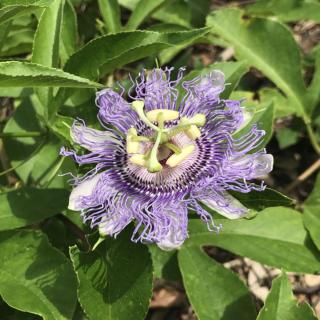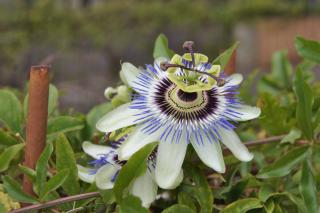

A climbing vine native to South American tropical regions, passion flowers are found on fertile and moist soil, in ditches and along the edges of open fields. A prized treat for gardeners and botanical curators alike, an incredible variety of species exist under the passion flower genus, with over four hundred catalogued throughout the world.
Generally grown in in tropical regions and warm temperate climates, many species of Passiflora grow in tropical Africa, Australia and Asia.
Since all the species of Passiflora have different chemical profiles, and thus different medicinal properties, we will address only characteristics attributed to Passiflora incarnata, also called purple passion flower or maypop. This species is native to the United States, and stands out from other species in that in winter, it is hardy and survives the cold (even though its leaves fall off).
We’re not yet quite sure how it happens, but this plant with many names might inhibit the activity of certain enzymes in the brain.
Well, what are this plant’s health benefits and therapeutic properties? How should it be used? Did you know that the agri-food industry and medical field have shown interest in the plant?
Here is what you need to know…
According to ancient writings, the story of Passiflora has the makings of a legend…
This flower is described as follows:

Surprised and full of wonder, this Italian monk devoted his life to “bringing to all the absolute proof of the existence of Christ and of his Passion” through this incredible plant!
The Passiflora genus is known under many names: passion flower, passion fruit, grenadille, maracuya, and many species within this genus have soothing properties that help reduce anxiety and sleeping disorders.
Indeed, several chemical compounds in the passion flower have appeasing effects on specific portions of the brain similar to those of GABA neurotransmitters. From there, it has been explained why passion flower can soothe the nervous system, allowing it to relax and enter into peaceful sleep.
Since passion flowers contain various flavonoids (which are well-known antioxidants concentrated in plant leaves), they may also have anxiolytic properties.

In the world of gastronomy, the fruit of Passiflora edulis (or grenadille) is very much appreciated for its sweet and tart taste. It is used to prepare exotic fruit juices, syrups and even sherbert ice cream.
Still others consider the vine an ornamental plant: in this case Passiflora caerulea or blue passion flower is preferred, and is mostly grown in temperate climates.
Passion flower is often recommended for patients who suffer of neurasthenia, insomnia, cerebral over-excitation and even a panel of nervous state symptoms such as hysteria, anxiety and heart palpitations.
With properties that are antispasmodic, passion flower is also used to treat menopausal disturbances, neuralgia, epilepsy and even spasmodic asthma.
Recently, further studies have demonstrated its cough suppressant properties, which support folkloric use regarding asthma.
To do away with anxiety and insomnia, it is recommended to absorb passion flower in the following forms:

Passion flower can lead to drowsiness and vertigo for some persons.
It may increase:
Passion flower seems to help treat:
Ingesting this plant is strongly not recommended to pregnant women.
In any case, it is always important to consult your family physician or any specialist (pharmacist, herbal medicine practitioner or phytotherapist) before following any plant-based treatment.